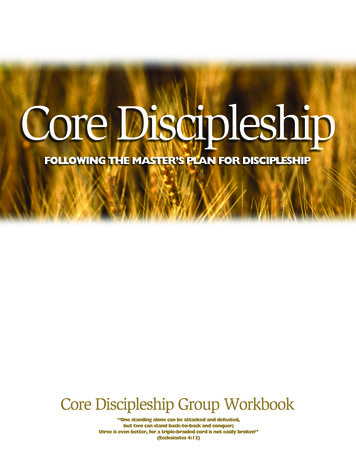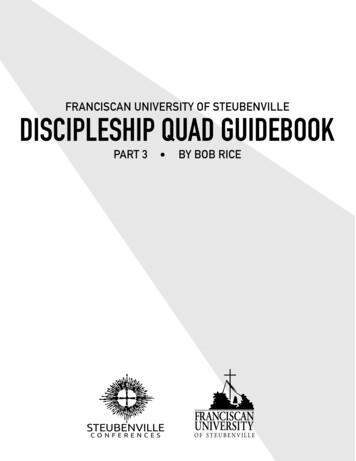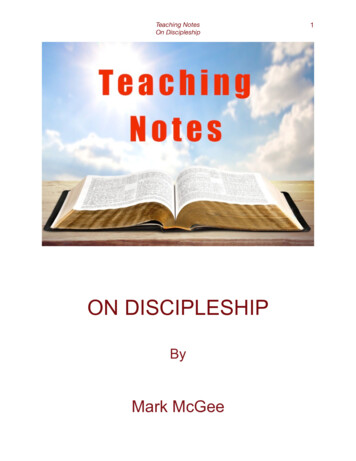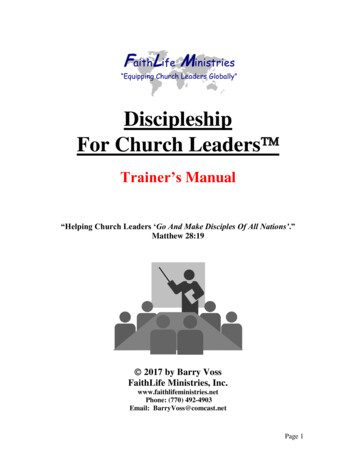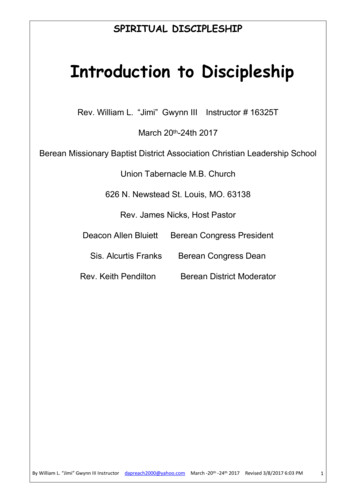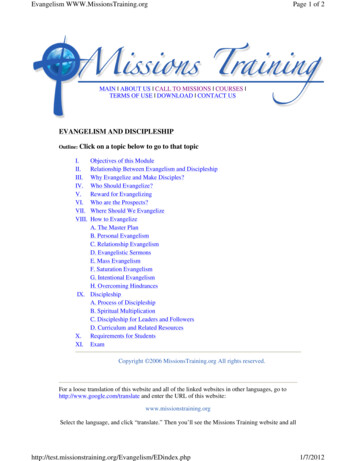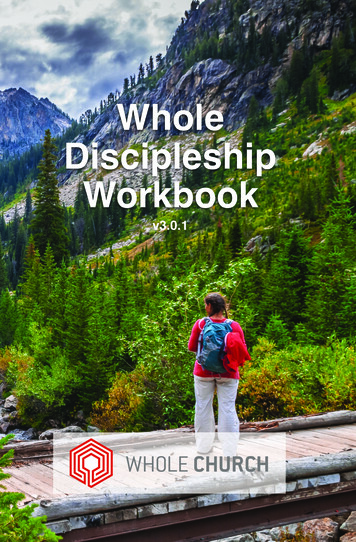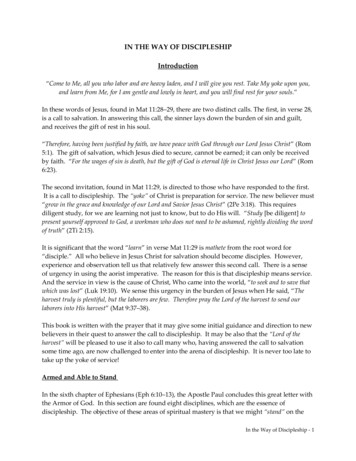
Transcription
IN THE WAY OF DISCIPLESHIPIntroduction“Come to Me, all you who labor and are heavy laden, and I will give you rest. Take My yoke upon you,and learn from Me, for I am gentle and lowly in heart, and you will find rest for your souls.”In these words of Jesus, found in Mat 11:28–29, there are two distinct calls. The first, in verse 28,is a call to salvation. In answering this call, the sinner lays down the burden of sin and guilt,and receives the gift of rest in his soul.“Therefore, having been justified by faith, we have peace with God through our Lord Jesus Christ” (Rom5:1). The gift of salvation, which Jesus died to secure, cannot be earned; it can only be receivedby faith. “For the wages of sin is death, but the gift of God is eternal life in Christ Jesus our Lord” (Rom6:23).The second invitation, found in Mat 11:29, is directed to those who have responded to the first.It is a call to discipleship. The ‚yoke‛ of Christ is preparation for service. The new believer must“grow in the grace and knowledge of our Lord and Savior Jesus Christ” (2Pe 3:18). This requiresdiligent study, for we are learning not just to know, but to do His will. “Study [be diligent] topresent yourself approved to God, a workman who does not need to be ashamed, rightly dividing the wordof truth” (2Ti 2:15).It is significant that the word “learn” in verse Mat 11:29 is mathete from the root word for“disciple.” All who believe in Jesus Christ for salvation should become disciples. However,experience and observation tell us that relatively few answer this second call. There is a senseof urgency in using the aorist imperative. The reason for this is that discipleship means service.And the service in view is the cause of Christ, Who came into the world, “to seek and to save thatwhich was lost” (Luk 19:10). We sense this urgency in the burden of Jesus when He said, “Theharvest truly is plentiful, but the laborers are few. Therefore pray the Lord of the harvest to send ourlaborers into His harvest” (Mat 9:37–38).This book is written with the prayer that it may give some initial guidance and direction to newbelievers in their quest to answer the call to discipleship. It may be also that the ‚Lord of theharvest‛ will be pleased to use it also to call many who, having answered the call to salvationsome time ago, are now challenged to enter into the arena of discipleship. It is never too late totake up the yoke of service!Armed and Able to StandIn the sixth chapter of Ephesians (Eph 6:10–13), the Apostle Paul concludes this great letter withthe Armor of God. In this section are found eight disciplines, which are the essence ofdiscipleship. The objective of these areas of spiritual mastery is that we might ‚stand‛ on theIn the Way of Discipleship - 1
field of battle as good soldiers of Christ Jesus. The ‚yoke‛ of service to Christ and the ‚armor‛ ofthe Christian soldier are the same. Like the 318 servants of Abraham who were ‚born inhis[own] house‛ (Gen 14:14), we are to be ‚trained‛ and “armed” for battle. The format of thisstudy will follow these eight disciplines:1. The Belt of Truth: Personal Bible studyHow to study the Bible for maximum benefit and growth2. The Breastplate of Righteousness: The Spirit-filled lifeHow to enter and maintain a life of spiritual power and purpose3. The Sandals of the Gospel: Christian serviceThe three areas of individual preparation and service4. The Shield of Faith: The faith-rest lifeWhat does the Scripture mean ‚the just shall live by faith‛?5. The Helmet of salvation: Personal security and stability in lifeThe necessity of keeping our eyes fixed on Jesus Christ6. The Sword of the Spirit: Fulfilling the great commissionHow to evangelize and disciple others7. The Power of Spiritual Prayer: The believer’s lifelineHow to pray with confidence and effectiveness8. The Spiritual War: Knowing and meeting the enemyHow to avoid being a casualty in the battle for soulsDiscipline 1: The Belt of TruthThe importance of personal Bible studyIn the preparation of the Roman soldier for battle, the first article of equipment taken up wasthe broad belt. The sword and breastplate, along with other necessary articles, were attached.Remember that Paul wrote Ephesians from a Roman prison. This “prison” was in fact “housearrest,” where he was under constant guard by Roman soldiers (Act 28:30). These weremembers of the elite Praetorian Guard, many of whom he led to a saving faith in the Lord (Phi1:12–13).Paul saw in the belt and shoulder strap, which supported it, an analogy to the importance ofpersonal Bible study. Everything in the life of a believer depends upon it. The Word of God isthe foundation of all spiritual life. The goal is to “stand” in the face of the enemy, and themeans to that end is to take up each article of armor. In terms of discipleship, this means toestablish the daily disciplines of the Christian life.The Key to FaithWe are told, in Rom 10:17 that ‚faith comes by hearing, and hearing by the Word of God.‛ Since faithis born out of receiving God’s Word, so also it must be sustained. The Word of God strengthensIn the Way of Discipleship - 2
our soul and gives us confidence in God, resulting in courage for life. It is in the Bible that wefind the answers to the problems and difficulties of life. To say “the just shall live by faith‛ (Hab2:4; Rom 1:17; Gal 3:11; Heb 10:38) is the same as saying, “the believer must live by the Word ofGod.”The Key to GrowthSpiritual hunger is one of the first evidences of new life. The soul that is renewed by faithcraves the Word of God. ‚As newborn babes, desire the pure milk of the Word, that you may growthereby, if indeed you have tasted that the Lord is gracious‛ (1Pe 2:2–3). Where this hunger is absent,there is reason to question the genuineness of the claim to conversion. Spiritual growth willsoon be evident, as this hunger leads from simple ‚milk‛ to ‚solid food‛ in the deeper truths ofthe Word of God (see Heb 5:11–14).The Key to SanctificationThe word “sanctify” means to “set apart to God” and includes the idea of purification. This isthe product of Bible study combined with obedience. We certainly cannot obey what we do notknow. “Since you have purified your souls in obeying the truth through the Spirit in sincere love of thebrethren, love one another fervently with a pure heart, having been born again, not of corruptible seed butincorruptible, through the Word of God which lives and abides forever” (1Pe 1:22–23). Spiritual lovecan only come from purity, and purity is the product of faithful study of and obedience to theWord of God. ‚Your word I have hidden in my heart, that I might not sin against You‛ (Psa 119:11).The Key to StabilityAt the moment of regeneration, the believer becomes a target of Satan and the fallen realm ofangels. Only grounding in the Word of God can provide necessary stability in the face of theirorganized attack on the soul. ‚Therefore gird up the loins of your mind, be sober, and rest your hopefully upon the grace that is to be brought to you at the revelation of Jesus Christ ‛ (1Pe 1:13). Onceagain the figure of the belt is used as symbolic of that which is foundational in the spiritual life.It has been well said, “Bibles that are falling apart usually belong to those who aren’t.” Stabilityis the result of study!The Key to VictoryThe spiritual life is a battle! The context of Ephesians six is conflict. The prospect is eithervictory or defeat. We see many defeated Christians, and the primary cause is the absence ofeffective study of the Word of God. ‚And they overcame him [Satan] by the blood of the Lamb [faithin Jesus] and by the word of their testimony [the Bible], and they did not love their lives to thedeath‛ (Rev 12:11).In the Way of Discipleship - 3
Even when we fall into sin, it is God’s Word which restores and revives us. ‚My soul clings tothe dust; revive me according to Your Word‛ (Psa 119:25). ‚For whatever is born of God overcomes theworld. And this is the victory that has overcome the world—our faith. Who is he who overcomes theworld, but he who believes that Jesus is the Son of God?‛ (1Jo 5:4–5).SUGGESTIONS FOR PERSONAL BIBLE STUDYThe list of benefits from the study of the Word of God could go on and on. All of these could becollectively called “wisdom.”‚The law of the Lord is perfect, converting the soul; the testimony of theLord is sure, making wise the simple‛ (Psa 19:7). Jesus said, ‚Therefore whoever hears these sayings ofMine, and does them, I will liken him to a wise man who built his house on the rock‛ (Mat 7:24). Asthe ‚belt of truth‛ must be put on daily, the following are some suggestions for daily Bible studyfor the new believer and disciple:Be Prepared to StudyCome to the Word of God with a humble and teachable attitude. Begin with prayer, includingconfession of any known sins (1Jo 1:9), and a request for the guidance of the Holy Spirit (Joh14:26, Joh 16:13).Be Reverent Toward GodWhen we approach the Word of God, we are entering into His very presence. As Moses wastold before the burning bush ‚the place where you stand is holy ground‛ (Exo 3:5). We mustsurrender to His authority, and be eager to obey when He speaks. The Spirit of God will speakto us through the Bible in that ‚still small voice‛ as He did to Elijah (1Ki 19:12). ‚The fear of theLord is the beginning of wisdom‛ (Pro 9:10).Be ConsistentThe Word of God is nourishment for our souls. ‚Man shall not live by bread alone, but by everyword that proceeds from the mouth of God‛ (Mat 4:4). We should be in the Word daily, just as weeat daily. You may not remember all that you read daily, any more than you remember whatyou ate last week—it will strengthen you just the same.Begin at the CenterGod works from the center to the circumference in our lives. He starts in the spirit, worksthrough the soul, and out from the body (Phi 2:12–13; 1Th 5:23). We should study the sameway. Begin at the heart of the Bible—the Gospels. Learn about the life and teaching of the LordJesus Christ. This lays a foundation for understanding all the Old Testament and the Epistles.Remember that the Bible is one unit, from beginning to end.In the Way of Discipleship - 4
Be SystematicDon’t jump around! Read a book, chapter-by-chapter and verse-by-verse. As a teenager, I usedto read a chapter each day and try to apply what I learned to that day. My children havedeveloped the same discipline, and their gain is obvious. Recognize that what you don’tunderstand will become clear as other Scripture sheds light on it, ‚comparing spiritual things withspiritual‛ (1Co 2:13). Mark Twain said, ‚It is not what I don’t understand about the Bible thattroubles me, but the things I do understand.‛ We should obey what we do understand, and leavethe rest for God to make clear later.Be TransformedThe Word will change our life if we let it. In learning the Word we are to ‚be transformed by therenewing of your mind‛ to do the will of God (Rom 12:2). It is the change wrought by an attitudeof surrender that is the heart of true worship (Gen 22:5; Rom 12:1). This is why Jesus said, ‚Godis Spirit, and those who worship Him must worship in spirit and truth‛ (Joh 4:24). In every PASSAGE,find the PRINCIPLE, to apply to your PRACTICE.Be United With OthersThe local church is ordained by the Lord as a place of worship, training, and fellowship (Act2:42, 5:42). Find a Bible-believing and teaching church led by a gifted pastor-teacher. The Bodyof Christ—the Church—is built by the teaching of God’s Word (Eph 4:11–16). To fail to takeadvantage of this provision is ‚forsaking the assembling of ourselves together‛ (Heb 10:25).Be DiligentIn all our study, we should make an effort to commit to memory what we are learning. Biblestudy is "inhale" that will later require "exhale." We will see this under the ‚sword‛ figure of thearmor. Any careful reading of the Gospels or Epistles will convince us that the authors hadcommitted a tremendous amount of Scripture to memory. Memorization requires repetition,but there is no substitute for having the instant recall of a verse or principle at the appropriatetime. ‚Let the Word of Christ dwell in you richly in all wisdom, teaching and admonishing one another ‛ (Col 3:16).Discipline 2: The Breastplate of RighteousnessThe Spirit-filled lifeThe tense of the verbs here implies that before we can take our stand we have to put on thearmor. The breastplate logically follows the belt, both for the Roman soldier and for theChristian soldier. The breastplate was attached to the belt. Without the belt, the breastplatecould not be secured. It was designed to protect the vital organs, and speaks here of practicalsanctification, or what we will call the Spirit-filled life. It is righteousness in the practical sense.In the Way of Discipleship - 5
Without it, we leave ourselves open to the devil's attack. Sin in our life gives the enemy a placeto work (Eph 4:27). The Roman breastplate only covered the front, for there was no thought ofturning the back to the enemy!The Gift of RighteousnessWhen we believe in Jesus Christ, we receive His righteousness as a free gift of God’s grace. Thisgift cost Christ everything, for‚[God] made Him [Jesus] who knew no sin to be sin for us, that wemight become the righteousness of God in Him‛ (2Co 5:21). God’s plan of salvation has neverchanged, for as ‚Abraham believed God, and it was accounted to him for righteousness‛ (Gen 15:6,Rom. 4:3) even so, ‚It shall be imputed to us who believe in Him who raised up Jesus our Lord from thedead‛ (Rom. 4:24), ‚Even the righteousness of God, through faith in Jesus Christ, to all and on all whobelieve‛ (Rom 3:22).The Practice of RighteousnessBecause God has already given us His righteousness, we have all the spiritual resources—through His Spirit—to live daily in a right relationship with Him. The Spirit of God empowersus to utilize our spiritual resources. As we submit to God, we are available ‚to be strengthenedwith might through His Spirit in the inner man‛ (Eph 3:16). We have the power of God available tous through the indwelling Holy Spirit. ‚For the law of the Spirit of life in Christ Jesus has made mefree from the law of sin and death . so that the righteousness of the law might be fulfilled in us who donot walk according to the flesh but according to the Spirit‛ (Rom 8:2, Rom 8:4). It is the Spirit-filledlife that is the ‚breastplate‛ that protects our spiritual “vitals” from the thrust of the enemy!The Spirit-Filled LifeThe New Testament places great emphasis on the ministry of the Spirit of God in the believer’slife. Unfortunately, there is so much distortion today among modern charismatics, that mostChristians are ignorant of the true nature and purpose of the Spirit's working. I will not labor todeal with all the current false teachings on this vital subject. Put plainly, the work of the Spiritis to reproduce the life of Jesus in the disciple. ‚I have been crucified with Christ; it is no longer Iwho live, but Christ lives in me; and the life which I now live in the flesh I live by faith in the Son of God,who loved me and gave Himself for me‛(Gal 2:20). In another place Paul says, ‚For me to live isChrist, and to die is gain‛ (Phi 1:21). For this reason, Paul speaks of ‚the Spirit of Christ who is inyou‛ (Rom 8:9–10).Concerning the true spiritual life there are four commands:1."Be filled with the Spirit"This command, which is found in Eph 5:18, speaks of the ideal Christian life. The wordtranslated ‚filled‛ suggests supply for a deficiency (see 2Co 2:16 and 2Co 3:5–6), along with theIn the Way of Discipleship - 6
idea of being controlled and influenced by God’s Spirit. The present imperative means “keepon being filled.” This implies that we must cooperate. We see this cooperation in such phrasesas ‚Let not sin reign in your mortal body‛ (Rom 6:12), and ‚Let the peace of God rule in your hearts .let the Word of Christ dwell in you richly‛ (Col 3:15–16). Notice how the idea of reigning or rulingis repeated here. Paul assures us that ‚those who receive the abundance of grace and of the gift ofrighteousness will reign in life through the One, Jesus Christ‛ (Rom 5:17). This self-mastery is theSpirit-filled life!2."Grieve not the Spirit"Turning to Eph 4:30, we find the first condition which interferes with the Spirit-filled life. Thecontext of verses 25–31 tells us that it is sin in our life that grieves the indwelling Spirit of God.In fact verse 24 is a plea to ‚put on the new man which was created according to God, in truerighteousness and holiness.‛ This ‚new man‛ (spiritual lifestyle), living in the power of the HolySpirit, is living a life pleasing to God. When we find that sin in our life has grieved the Spirit,we are told to confess it and forsake it that we might be cleansed and restored to a right relationto God (Pro 28:13; 1Jo 1:9). Daily self-examination and confession is essential to the disciple(1Co 11:28, 31).3."Quench not the Spirit"This command from 1Th 5:19 deals with another hindrance to the control of the Spirit. Whereasthe previous command concerned sins of commission, here we must deal with sins of omission.From 1Th 5:11–22, we have at least 18 commands. When we resist the commands of the Bible,we resist God’s Spirit. Jesus said to the people of His day, ‚It is the Spirit who gives life thewords that I speak to you are spirit and they are life‛ (Joh 6:63). When Paul said to Timothy, ‚stir upthe gift of God which is in you‛ (2Ti 1:6), he uses a word that means to “stir up the fire.” No doubtthis warning was necessary because Timothy had failed to heed Paul’s earlier warning.Apathy to the things of God will surely result in the quenching of the Spirit!4."Walk in the Spirit"In the four spiritual commands, two are negative (‚grieve not‛ and ‚quench not‛), and two arepositive (‚be filled‛ and ‚walk in the Spirit‛). If the disciple has confessed any and all known sin,has chosen to yield to the Spirit's leading, he may then maintain a life of spiritual power by“walking in the Spirit” (Gal 5:16, 25). This implies a moment-by-moment dependence. Again,using the soldier analogy, Paul says, ‚Present yourselves to God as being alive from the dead, andyour members as instruments [weapons] of righteousness to God‛ (Rom 6:13).In summary, we can say that the Spirit of God indwells every believer for the purpose ofmaking us like Christ. The Spirit-filled life is the Christ-centered life. If we daily disciplineourselves, we will maintain a life under the control and influence of “the Spirit of Christ.” SuchIn the Way of Discipleship - 7
a life will be marked by the sure fruits of the Spirit (Joh 15:1–8; 1Co 13:4–8; Gal 5:22). It is God’swill that each believer be able to say, “Christ lives in me.” Then it will be true of us that, ‚If wewalk in the light as He is in the light, we have fellowship with one another, and the blood of Jesus ChristHis Son cleanses us from all sin‛ (1Jo 1:7). Then, and only then, have we ‚put on the breastplate ofrighteousness.‛ The believer is then protected in the “vitals” of the spiritual life, maintaining aright relation of fellowship with God.Discipline 3: The Sandals of the GospelChristian ServiceThe Roman soldier was famed throughout the ancient world for his ability to march longdistances (up to 30 km in five hours), drop his pack, and go into battle. This capability was dueto intensive training and endurance, and to the “combat-sandals” which he wore. These werethe forerunner of the modern combat boot. Their heavy-lugged soles gave secure footing, andthe tight weaving of heavy straps protected the feet and ankles. The value of the sandal wasrealized only through much exertion, for which reason Paul calls them the ‚preparation of thegospel of peace‛ (Eph 6:15). The word used here suggests a firm foundation based on extensivepreparation.The Disciple's Three-fold PreparationSandals and feet in Scripture are suggestive of service. For example, in the parable of theprodigal (Luke 15), upon his return to the Father, he is supplied—among other things—withnew sandals for his feet. In Isa 52:7 and Rom 10:15, we read ‚how beautiful are the feet of those whopreach the gospel of peace, who bring glad tidings of good things.‛ Probably because of these verses,the sandals spoken of in Eph 6:15 are often only related to the work of evangelism. However,we must not overlook the fact that they are ‚the preparation of the gospel of peace.‛ I think it is safeto say that much evangelism goes on without much ‚preparation.‛1.Personal Preparation as a PriestIn 1Pe 2:4–10, we find a teaching unique to the New Testament. We are told that every believerin Jesus Christ is a member of ‚a holy priesthood‛ and a ‚royal priesthood.‛ The only royalpriesthood in Scripture is that of the order of Melchizedek (Gen 14:18–20) over which JesusChrist presides as High Priest (Psa 110:4; Heb 5:6; Heb 5:10; Heb 7:21). As members of HisBody, we share in His priesthood.Our two-fold function is given as that of offering "spiritual sacrifices acceptable to God‛ and ofproclaiming "the praises of Him who called you out of darkness into His marvelous light.‛ In short,the priest was to reveal God to men and to lead men to God (Heb 5:1–4). The priest offeredsacrifices for cleansing, first "for himself and for the people's sins‛ (Lev 16:24; Heb 9:7). Our offeringis confession for our own sins, and intercession in behalf of others. ‚Therefore by Him let uscontinually offer the sacrifice of praise to God, that is, the fruit of our lips, giving thanks to HisIn the Way of Discipleship - 8
name‛ (Heb. 13:15). ‚Therefore I exhort first of all that supplications, prayers, intercessions, and givingof thanks be made for all men‛ (1Ti 2:1). Having faithfully prayed for specific people, we are moreprepared to proclaim to them the Gospel of the Lord Jesus Christ.2.Collective Preparation as a BodyBeyond the personal preparation each must make, there is necessity of the entire Body beingprepared. Christian service is a team effort! No area of our service to the Lord stands alone—isolated from others.Within the local church, various gifts are (or should be) at work to build up the whole. As thepastor teaches the Word of God by his gift, the result is ‚the equipping of the saints for the work ofministry‛ (Eph 4:12a), so that as other gifts begin to minister, they work ‚for the edifying of thebody of Christ‛ (Eph 4:12b). Since every believer is given ‚the manifestation of the Spirit for theprofit of all‛ (1Co 12:7), we are commanded, ‚as each one has received a gift, [let us] minister to oneanother, as good stewards of the manifold grace of God‛ (1Pe 4:10). We are not only all priests, weare all ministers!3.United Advance as AmbassadorsOnly when individual believers are prepared as priests, and the Body of Christ is beingstrengthened by many gifts, are we able to advance in the way Christ envisioned Histriumphant Church. ‚On this [R]ock I will build My church, and the gates of Hell shall not prevailagainst it‛ (Mat 16:18). Satan knows that the Church united is a Church triumphant andunstoppable. Little wonder that he spends so much time working to divide the family of God.And he finds so many willing helpers! ‚Now then, we are ambassadors for Christ, as though Godwere pleading through us: we implore you on Christ’s behalf, be reconciled to God‛(2Co 5:20). But thechurch that is unable to reconcile within itself will never have power in bringing men intoreconciliation with God.The disciple, then, is to put on the sandals, which will give a secure footing in service to God.This requires much preparation, as Paul suggests. We must develop our Christian service: as apriest who is washed and cleansed for service, as a minister who builds up others in the Body ofChrist, and as an effective ambassador calling the lost to Christ. A local church where manydisciples are engaged in these disciplines will be a powerful force for the building up of thesaints and the winning of the lost to Christ. ‚He who wins souls is wise‛ (Pro 11:30).Discipline 4: The Shield of FaithThe Faith-Rest LifeWhat does the Scripture mean ‚the just shall live by faith‛? The Roman soldier spent as muchtime learning the use of the shield as he did the sword. They worked together as defense andoffense. The shield was a large rectangular shape, like a door. Called in Latin the scutum, it wasIn the Way of Discipleship - 9
made of wood, covered with leather, and edged with iron. Often before battle it was soaked inwater, for the very purpose of putting out flaming arrows. Just as the sandals suggest that weare advancing, so also the shield suggests that such advance will be met by resistance from theenemy. It is axiomatic that those who are most aggressive in the spiritual realm will face thebrunt of opposition and persecution. For this we must be prepared. It is just after He hasspoken of the peacemakers (ministers of reconciliation) that Jesus says, ‚Blessed are those who arepersecuted for righteousness sake‛ (Mat 5:10) and Paul assures us that ‚all who desire to live godly inChrist Jesus will suffer persecution‛ (2Ti 3:12).This shield is called specifically ‚the shield of faith.‛ It speaks of faith, not as taking in God’sWord, but as using it to meet life’s problems. It is an illustration of the faith-rest life. Jesus saidone of the benefits of the life of a disciple is ‚you will find rest for your souls‛ (Mat 11:29). We aretold, ‚the just shall live by faith‛ (Rom 1:17), as quoted from Hab 2:4. And the product of faith isrest,—hence, the faith-rest life! It means a life of inner peace and calm, based on trust in thefaithfulness of God. In the midst of changing circumstances, our God never changes. ‚JesusChrist is the same yesterday, today, and forever‛ (Heb. 13:8).The immutability (unchangeableness) of Jesus Christ is reflected in the Word of God. ‚Heavenand earth will pass away, but My words will by no means pass away‛ (Mat 24:35). We can trust thepromises of the Word of God. In the trials of life, our souls can find rest by trusting in theunshakeable promises He has given us.In Hebrews 4, we are given an overview of the faith-rest life. And what is this life? In thebook Hudson Taylor's Spiritual Secretby Dr. and Mrs. Howard Taylor, chapters 14 and 15 relatehow this great missionary—after years of spiritual struggle—found the way into what theycalled, “soul-rest.” This was nothing more than resting by faith in the clear and sure promisesof God. Four times in both the Old and New Testaments we are told, ‚The just [saved] shall liveby faith.” This is the faith-rest life. Look at Hebrews chapter four.Ingredients of the Faith-Rest Life: Hebrews 4It is entered by mixing the promises of God’s Word with pure faith. ‚For we who have believed doenter that rest,‛ (see Heb 4:1–3a). The verbs here indicate that we cannot enter until first wetrust!By faith, we enter a sharing of God’s ‚rest‛ in His finished work. ‚The works were finished fromthe foundation of the world‛(Heb 4:3b). In Gen 2:2 we are told that God rested because His workwas done. Everything necessary for the fulfillment of His grand plan was put into motion. Andso we read that the Lamb of God was ‚slain from the foundation of the world‚ (Rev 13:8), Hiskingdom was just as surely prepared for all who believe ‚from the foundation of the world‛ (Mat25:34), and the names of all who would believe were ‚written in the Lamb's Book of Life‛ (Rev21:27). This is why Jesus on the cross cried out ‚It is finished!‛ (Joh 19:30).In the Way of Discipleship - 10
Men are invited throughout history to enter into this rest (Heb 4:6–9). Every generation of menhas been invited to enter His rest. But to those who “harden their hearts” and do not believeGod’s Word, He says, ‚they shall not enter My rest‛ (Heb 4:5–7).The faith-rest life is a moment-by-moment sabbath (Heb 4:9–10). The word ‚rest‛ in Heb 4:9is sabbatismos, meaning “sabbath-rest.” On the Sabbath, men were to “cease from their ownworks” and rest in the provision of God (see Exo 16:22–26). When we claim the promises ofGod, we are resting in His provision for us. This means that we trust in His work in our behalf.‚Then they said to Him, ‘What shall we do, that we may work the works of God?’ Jesus answered andsaid to them, ‘This is the work of God, that you believe In Him whom He sent‛ (Joh 6:28–29).The faith-rest involves diligent study of and active obedience to the Word of God (Heb 4:11–12).The word ‚diligent‛ here is the same one found in 2Ti 2:15. Since we must believe the Word ofGod to enter His rest (Heb 4:2–3), it follows that daily rest requires daily study in faith.We must be open to correction and confession of sin (Heb 4:12–13). God’s Word convicts usand corrects our thoughts, motives and actions. When we are “reproved” (2Ti 3:16), we shouldconfess our sin for cleansing and restoration to fellowship with God. ‚If we confess our sins, He isfaithful and just to forgive us our sins, and to cleanse us from all unrighteousness‛(1Jo 1:9). Confessionkeeps us honest with ourselves and with God. Sin in our life breaks our communion with God,and unconfessed sin remains a barrier to the enjoyment of His power and blessing in our life.There is no rest in our soul when we grieve or quench the Spirit of God.There is focus on Jesus Christ through prayer (Heb 4:14–16). Later (Heb 12:2), we are told tokeep ‚looking unto Jesus.‛ As He speaks to us through His Word, we are to respond to Him inour prayers. Spiritual communication is necessary to maintain a vital spiritual relationship withGod. No relationship can thrive without regular communication. Jesus represents us in thepresence of God. We are to represent Him before men. We will only ‚hold fast our confession‛ orwitness, as we “come boldly to the throne of grace‛ in prayer. It is here we will find His mercy andgrace to be all-sufficient for help in every need.When we claim the promises contained in God’s Word, we are taking up the ‚shiel
In the Way of Discipleship - 1 IN THE WAY OF DISCIPLESHIP Introduction “Come to Me, all you who labor and are heavy laden, and I will give you rest. Take My yoke upon you, and learn from Me, for I am gentle and lowly in heart, and you will find rest for your souls.” In these words of Je
